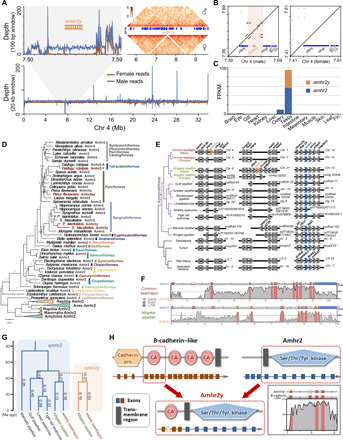Fig. 3
(A) Characterization of a Y-specific region in the common seadragon. Illumina data illustrating the relative read depth across a region of Chr4, in males (blue line) and females (red line) showing a coverage difference between the two; the Hi-C data heatmap of the Y-specific region showing the male-specific region, with half of the average read-coverage; gene annotation indicates only one gene (amhr2y, represented in orange). (B) Repetitive sequences present in the Y-specific region of the male genome but not in the female. (C) Tissue-specific expression of amhr2y and amhr2 in the common seadragon. (D) Phylogenetic tree of amhr2 amino acid sequences in vertebrates. The Y-specific amhr2 (red) originated independently in pufferfish (T. rubripes), yellow perch (P. flavescens), and the common ancestor of common seadragon (P. taeniolatus) and alligator pipefish (S. biaculeatus). (E) Synteny analysis of amhr2y and amhr2 loci in the common seadragon, alligator pipefish, and other teleosts. (F) Identity plot of the alignment of amhr2y gene with the autosomal amhr2 gene sequence in the common seadragon and alligator pipefish. (G) The duplication event of amhr2y is shown as a dashed line in the phylogenetic tree. Clades of amhr2 and amhr2y are in blue and orange, respectively. The ω values are shown at the right of each branch. (H) Schematic depiction of the events leading to the formation of the alligator pipefish amhr2y gene, which is likely to be the result of fusion between B-cadherin–like and amhr2 genes.

